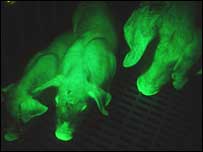Lumen Fidei"The Light of Faith"
|
|
Thursday, January 12, 2006
Wednesday, January 11, 2006
Mass at Emmaus
13 That very day two of them were going to a village named Emmaus, about seven miles from Jerusalem, 14 and talking with each other about all these things that had happened. 15 While they were talking and discussing together, Jesus himself drew near and went with them. 16 But their eyes were kept from recognizing him. 17 And he said to them, "What is this conversation which you are holding with each other as you walk?" And they stood still, looking sad. 18 Then one of them, named Cle'opas, answered him, "Are you the only visitor to Jerusalem who does not know the things that have happened there in these days?" 19 And he said to them, "What things?" And they said to him, "Concerning Jesus of Nazareth, who was a prophet mighty in deed and word before God and all the people, 20 and how our chief priests and rulers delivered him up to be condemned to death, and crucified him. 21 But we had hoped that he was the one to redeem Israel. Yes, and besides all this, it is now the third day since this happened. 22 Moreover, some women of our company amazed us. They were at the tomb early in the morning 23 and did not find his body; and they came back saying that they had even seen a vision of angels, who said that he was alive. 24 Some of those who were with us went to the tomb, and found it just as the women had said; but him they did not see." 25 And he said to them, "O foolish men, and slow of heart to believe all that the prophets have spoken! 26 Was it not necessary that the Christ should suffer these things and enter into his glory?" 27 And beginning with Moses and all the prophets, he interpreted to them in all the scriptures the things concerning himself. 28 So they drew near to the village to which they were going. He appeared to be going further, 29 but they constrained him, saying, "Stay with us, for it is toward evening and the day is now far spent." So he went in to stay with them. 30 When he was at table with them, he took the bread and blessed, and broke it, and gave it to them. 31 And their eyes were opened and they recognized him; and he vanished out of their sight. 32 They said to each other, "Did not our hearts burn within us while he talked to us on the road, while he opened to us the scriptures?" 33 And they rose that same hour and returned to Jerusalem; and they found the eleven gathered together and those who were with them, 34 who said, "The Lord has risen indeed, and has appeared to Simon!" 35 Then they told what had happened on the road, and how he was known to them in the breaking of the bread. -Luke 24:13-34
Dr. Twellman showed us the direct parallel in this passage with the Mass. In the same way that the Mass is broken into two parts, the Liturgy of the Word, and the Liturgy of the Eucharist, Cleopas and his companion experienced a two-part liturgy with Jesus. First, as they were walking with him, in verse 27 they heard the scriptures, along with an explanation of their meaning (a homily). Then, in verse 30, the breaking of the bread (the Eucharist).
We can learn something more from this passage as well. In the experience of having the scriptures opened to them, the disciples' perceived that their hearts burned within themselves. Are our hearts lit on fire when we encounter the scriptures? Are we open to the grace and wisdom available in the encounter with God's word? Obviously this doesn't refer to a physical sensation, but something much deeper.
Finally, do we, like the disciples, recognize Christ in the Eucharist? When the consecrated host is given to us, and we give our "Amen" to the refrain "The Body of Christ," are we just going through the motions, or do we really, truly recognize our Lord?
Some points to reflect upon the next time I am at Mass...
Tuesday, January 10, 2006
I'm back...
in school, that is.
This past weekend was yet another edifying time for reflecting upon God and learning more about Him. Because, after all, that's what Theology is. The study of God (and supernatural things).
Faith is two things:
1) An intellectual assent to certain truths (i.e. the Creed).
2) A personal relationship with my Lord and Savior.
Studying theology gives a better understanding of the truths to which I assent. (#1 above) And it also helps strengthen my relationship with God (#2 above), in the same way that learning more about my wife helps strengthen my relationship with her. Even being married for 2 1/2 years, I still learn new things each and every day. I don't doubt that I will say the same, even after 25 years. And each new thing (okay, well, most new things... sorry, Joy!), endears her to me ever more.
That is why I study Theology.

